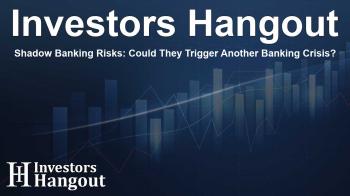Shadow Banking Risks: Could They Trigger Another Banking Crisis?

Understanding the Threat of Shadow Banking
The Financial Stability Board (FSB) has raised significant concerns regarding the shadow banking system. This area of finance operates with high levels of leverage and a lack of transparency that poses serious risks to the overall financial system. According to the FSB, shadow banking can enable intricate financial interconnections that make it challenging for regulators to monitor risks effectively.
What is Shadow Banking?
Shadow banking refers to financial intermediaries that do not have the same regulatory oversight as traditional banks. These entities can include hedge funds, private equity firms, and other non-bank financial institutions that engage in lending and borrowing. Given their opacity, the risks associated with these institutions can often remain hidden until a crisis erupts.
High Leverage and Its Implications
One of the main issues with shadow banking is its high leverage. The FSB outlines how excessive leverage can lead to liquidation channels. In unfortunate circumstances, when sudden liquidity demands arise—such as collateral requirements or margin calls—investors may need to unwind their positions by selling assets. This asset liquidation can contribute to crashing prices and worsening liquidity issues, creating a cycle of financial stress.
Counterparty Risks
The interplay between leveraged entities and their counterparties is another crucial factor. If a shadow bank becomes distressed or defaults, it can directly impact other financial institutions linked to it. The initial shock can ripple through the financial system, affecting even those organizations that are otherwise sound. If banks cannot absorb these losses, they too can enter financial distress.
Recent Events Highlighting Shadow Banking Risks
We've seen the effects of shadow banking during various financial episodes in recent years. For instance, the volatility in the US Treasury market in 2020 pushed traders to unwind their positions, leading to increased sales volumes and instability. The collapse of Archegos Capital in 2021 also showcased how interconnected risks could lead to the downfall of significant institutions like Credit Suisse, demonstrating that even well-regarded banks are vulnerable to the perils of shadow banking.
Financial Stress Episodes
Recent years have witnessed incidents that underline the vulnerabilities of shadow banking:
The global financial crisis of March 2020 revealed how margin increases affected trading positions across the board, leading to widespread instability.
In March 2021, the fallout from Archegos Capital's failure resulted in significant losses for its counterparties, illustrating the fragility of interconnected financial systems.
2022 also experienced commodity market stresses when rising margins forced liquidations, amplifying risks among clearing members.
The September 2022 Liability-Driven Investment crisis showcased how excessive leverage led to position liquidations and heightened risks in the UK Gilt market.
Implications for Large Banks
Given the extensive $5 trillion extended by US banks to shadow banks, a significant crisis could have devastating effects on these lending institutions. The current landscape reveals many concerning factors, especially among larger banks, as they often have higher exposures to shadow banking risks. As the FSB notes, the interconnectedness of large banks with shadow lenders increases vulnerability to destabilizing shocks.
Evaluating the Banking Landscape Today
While smaller community banks may face fewer challenges, larger institutions grapple with numerous risk factors, including significant issues in commercial real estate and increasing consumer debt. These conditions not only echo pre-2008 financial crisis levels but also paint a concerning picture for the future of larger banks. The scale of problems faced by prominent financial institutions poses questions about their stability moving forward.
As we cautiously navigate this complex financial landscape, it's vital for consumers to undertake due diligence when choosing where to bank. Understanding the risks associated with shadow banking can empower individuals to make informed decisions about their finances. Always consider the resilience of the institutions holding your money, especially in an ever-evolving economic environment.
Frequently Asked Questions
What is shadow banking?
Shadow banking refers to financial activities that occur outside traditional banking regulations, involving entities like hedge funds and private equity without the same oversight.
Why is shadow banking considered risky?
Shadow banking systems operate with high leverage and lack transparency, presenting risks that can impact overall financial stability.
How does shadow banking relate to large banks?
Large banks often provide leverage to shadow banks, making them vulnerable to crises that can emerge from the instability of these unregulated entities.
What recent events highlighted the issues with shadow banking?
Recent market events, including the collapse of Archegos Capital and volatility in the March 2020 Treasury market, exposed weaknesses in the shadow banking sector.
What should consumers consider regarding their banking choices?
Consumers should evaluate the financial health and risk exposure of their banks, especially in light of the interconnected risks presented by shadow banking activities.
About The Author
Contact Kelly Martin privately here. Or send an email with ATTN: Kelly Martin as the subject to contact@investorshangout.com.
About Investors Hangout
Investors Hangout is a leading online stock forum for financial discussion and learning, offering a wide range of free tools and resources. It draws in traders of all levels, who exchange market knowledge, investigate trading tactics, and keep an eye on industry developments in real time. Featuring financial articles, stock message boards, quotes, charts, company profiles, and live news updates. Through cooperative learning and a wealth of informational resources, it helps users from novices creating their first portfolios to experts honing their techniques. Join Investors Hangout today: https://investorshangout.com/
The content of this article is based on factual, publicly available information and does not represent legal, financial, or investment advice. Investors Hangout does not offer financial advice, and the author is not a licensed financial advisor. Consult a qualified advisor before making any financial or investment decisions based on this article. This article should not be considered advice to purchase, sell, or hold any securities or other investments. If any of the material provided here is inaccurate, please contact us for corrections.

